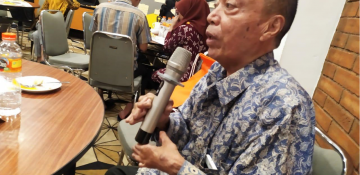Recommendations on Convention on the Rights of Persons with Disabilities report Indonesia
The Convention on the Rights of Persons with Disabilities (CRPD) is the first comprehensive human rights treaty of the 21st century and is the first human rights convention to be open for signature by regional integration organisations. Governments that have ratified the CRPD must submit a report to the Committee on the Rights of Persons with Disabilities about the steps they have taken to implement the provisions of the Convention.

The Convention on the Rights of Persons with Disabilities (CRPD) is the first comprehensive human rights treaty of the 21st century and is the first human rights convention to be open for signature by regional integration organisations.
The Convention is intended as a human rights instrument with an explicit, social development dimension. It adopts a broad categorization of persons with disabilities and reaffirms that all persons with all types of disabilities must enjoy all human rights and fundamental freedoms.
Governments that have ratified the CRPD must submit a report to the Committee on the Rights of Persons with Disabilities about the steps they have taken to implement the provisions of the Convention. After the initial State Party Reports, countries need to submit periodic reports/replies to lists of issues every four years. NGOs, National human rights institutions, UN specialised agencies and other bodies can also submit information (shadow reports) as part of the reporting process which is reviewed by the Committee in addition to the State Party Report.
After reviewing State Party and shadow reports, and after undertaking a ‘constructive dialogue’ with State Party representatives, the Committee on the Rights of Persons with Disabilities will issue Concluding Observations, which include recommendations for the State Party on efforts or measures it must take in order to improve their implementation of the CRPD.
NLR Indonesia in collaboration with 13 other organisations in Indonesia that actively advocate for the fulfilment of the rights as citizens for Persons Affected by leprosy, as guaranteed in the CRPD, have jointly written a shadow report.
Most of these organisations are directly led by persons affected by leprosy. In others, they play a significant participatory role in organisational decisions. ILEP, a federation of anti-leprosy agencies based in Geneva, has supported the process.
Recommendations to improve current status persons affected by leprosy
- In the report, recommendations are made on how to improve the rights of persons affected by leprosy in Indonesia. Some of the most vital recommendations are listed below.
- Given the stagnant percentage of cases of children, the handling needs to be more focused and get the attention of various parties including child stakeholders.
- The media needs to be involved in the more massive publication of works produced by persons affected by leprosy.
- Socialization, awareness raising and training needs to be done in more significant frequency and in broader geographical coverage to health workers, because many of them are still lacked of understanding and capacity about leprosy.
- The government needs to be more vigorous in disseminating information, education and communication materials to publicabout the status of leprosy in Indonesia; not only in early detection, but also in reducing stigma and discrimination against persons affected by leprosy.
- Socialization and education to build awareness about equality of human rights, including persons affected by leprosy, and stigma reduction need to be carried out continuously against community leaders, religion and key groups in the community.
- Leprosy organisations and persons affected by leprosy need to increase knowledge about gender in order to be able to strengthen fellow persons affected by leprosy (especially women) and advocate for the rights of women affected by leprosy.
- The naming of ‘elimination’ of leprosy needs to be reviewed. In Indonesia this term is used to mean not ‘elimination’ (no more disease) but ‘elimination as a public health problem’ (one new case per 10,000 population). Areas that has been declared successful in eliminating leprosy and low endemic seem to have completed its task in handling leprosy. As the matter of fact, new cases still exist, not zero cases. Because it is considered that the number of cases is small, so the regional budget for leprosy programs is minimal and not a priority. This would become a time bomb for the region, and it is not impossible that one day the area will become high endemic again.
Intended Impact of the shadow report
Addressing the above conditions, not only national but global joint efforts need to be made to ensure the fulfillment of the rights of persons affected by leprosy as both local and global citizens. This report is expected to be taken into consideration by decision makers at the international levels, UN Committees and other relevant agencies